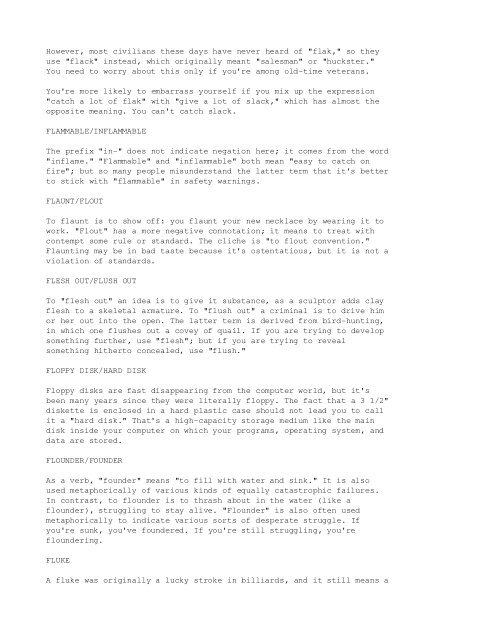Common_Errors_in_English_usage
Common_Errors_in_English_usage
Common_Errors_in_English_usage
Create successful ePaper yourself
Turn your PDF publications into a flip-book with our unique Google optimized e-Paper software.
However, most civilians these days have never heard of "flak," so they<br />
use "flack" <strong>in</strong>stead, which orig<strong>in</strong>ally meant "salesman" or "huckster."<br />
You need to worry about this only if you're among oldtime veterans.<br />
You're more likely to embarrass yourself if you mix up the expression<br />
"catch a lot of flak" with "give a lot of slack," which has almost the<br />
opposite mean<strong>in</strong>g. You can't catch slack.<br />
FLAMMABLE/INFLAMMABLE<br />
The prefix "<strong>in</strong>" does not <strong>in</strong>dicate negation here; it comes from the word<br />
"<strong>in</strong>flame." "Flammable" and "<strong>in</strong>flammable" both mean "easy to catch on<br />
fire"; but so many people misunderstand the latter term that it's better<br />
to stick with "flammable" <strong>in</strong> safety warn<strong>in</strong>gs.<br />
FLAUNT/FLOUT<br />
To flaunt is to show off: you flaunt your new necklace by wear<strong>in</strong>g it to<br />
work. "Flout" has a more negative connotation; it means to treat with<br />
contempt some rule or standard. The cliche is "to flout convention."<br />
Flaunt<strong>in</strong>g may be <strong>in</strong> bad taste because it's ostentatious, but it is not a<br />
violation of standards.<br />
FLESH OUT/FLUSH OUT<br />
To "flesh out" an idea is to give it substance, as a sculptor adds clay<br />
flesh to a skeletal armature. To "flush out" a crim<strong>in</strong>al is to drive him<br />
or her out <strong>in</strong>to the open. The latter term is derived from birdhunt<strong>in</strong>g,<br />
<strong>in</strong> which one flushes out a covey of quail. If you are try<strong>in</strong>g to develop<br />
someth<strong>in</strong>g further, use "flesh"; but if you are try<strong>in</strong>g to reveal<br />
someth<strong>in</strong>g hitherto concealed, use "flush."<br />
FLOPPY DISK/HARD DISK<br />
Floppy disks are fast disappear<strong>in</strong>g from the computer world, but it's<br />
been many years s<strong>in</strong>ce they were literally floppy. The fact that a 3 1/2"<br />
diskette is enclosed <strong>in</strong> a hard plastic case should not lead you to call<br />
it a "hard disk." That's a highcapacity storage medium like the ma<strong>in</strong><br />
disk <strong>in</strong>side your computer on which your programs, operat<strong>in</strong>g system, and<br />
data are stored.<br />
FLOUNDER/FOUNDER<br />
As a verb, "founder" means "to fill with water and s<strong>in</strong>k." It is also<br />
used metaphorically of various k<strong>in</strong>ds of equally catastrophic failures.<br />
In contrast, to flounder is to thrash about <strong>in</strong> the water (like a<br />
flounder), struggl<strong>in</strong>g to stay alive. "Flounder" is also often used<br />
metaphorically to <strong>in</strong>dicate various sorts of desperate struggle. If<br />
you're sunk, you've foundered. If you're still struggl<strong>in</strong>g, you're<br />
flounder<strong>in</strong>g.<br />
FLUKE<br />
A fluke was orig<strong>in</strong>ally a lucky stroke <strong>in</strong> billiards, and it still means a





